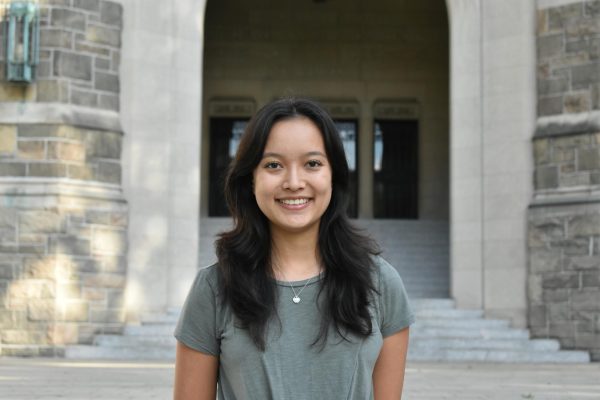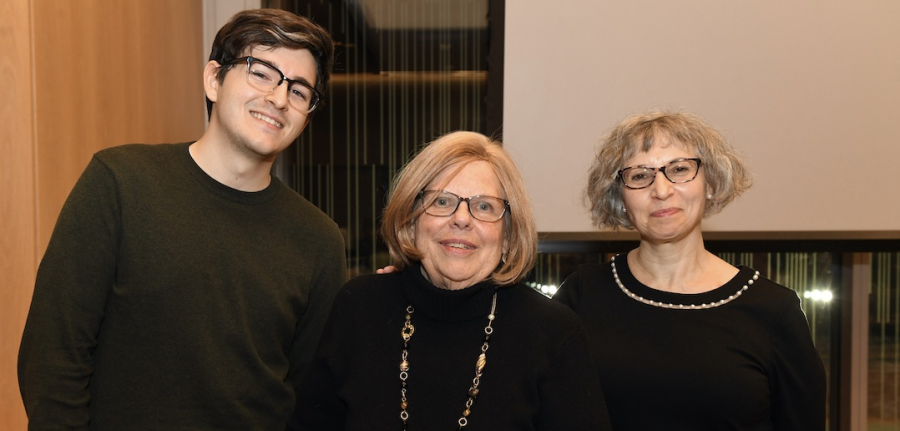Marilyn Martone Gives the 2022 Gannon Lecture
On Nov. 9, Fordham hosted the 2022 Gannon Lecture and Reception in the Great Hall of the McShane Campus Center. The event featured Marilyn Martone, Ph.D., who presented “From Trauma to Disability: Examining Our Cultural Values.”
The Gannon Lecture is named after Rev. Robert I. Gannon, S.J., president of Fordham University from 1936 to 1949.
The lecture originated in fall 1980, and since then, it has had many distinguished speakers lecture on important issues in their area of expertise.
Martone is a retired associate professor at St. John’s University in Jamaica, N.Y. She taught moral theology of health care for many years at both the undergraduate and graduate levels. Martone also represented the Holy See at the United Nations on women’s issues for seven years.
In addition, she has served on multiple hospital ethics committees. In 2002, she was the recipient of an NEH grant on “Justice, Equality and the Challenge of Disability,” and in 2007, she was one of the two recipients of a fellowship on disability ethics.
She is also the author of “Over the Waterfall,” a memoir about a traumatic accident that her daughter, Michelle, went through in 1998. With her own personal experience, she is able to advocate for and discuss the marginalization of those with disabilities.
The event began with the lecture at 5:30 p.m., and it started with a clip from the PBS documentary, “Your Health: A Sacred Matter,” in which Martone and her daughter were featured.
It explained the background of what happened to Michelle and the aftermath of her daughter’s accident.
Since the accident, Martone has advocated for her daughter’s health and brought up many relevant issues in the healthcare system. She examines the effect that trauma can have on peoples’ lives and subsequently what it is like to be processed through a fragmented healthcare system that focuses on acute care.
Martone said that people with disabilities are marginalized in our society today and how cultural attitudes toward vulnerability affect the people who need help the most. “Our culture influences the way we think. In this culture, you do not want to appear vulnerable,” said Martone during the lecture.
Martone relates vulnerability to how we view caregivers too. While caregivers provide a much-needed service, they are undervalued in our culture that emphasizes independence, explained Martone.
One of Martone’s main points during her lecture was that the healthcare system is not properly set up for people with disabilities.
Instead of accommodating people for their different needs, the healthcare system tries to get people out as soon as possible. “The system is set up to restore someone to independence or discharge them to a lower level facility where they receive less care,” said Martone. Instead of a system that puts vast resources into “fixing” people, Martone believes that the system needs to teach them how to live with a chronic illness. Martone believes that these attitudes about vulnerability and independence come from our own society and culture, and it emphasizes the fact that we don’t live in a gifting society.
“In gifting societies, gifts are meant to be passed on to make us a community of givers. Gifts are central to fostering relationships,” said Martone. “We begin life in a relationship, and we depend on others for care. When we receive care, we should take it. When we can give care, we should give it.”
Because of how the system was set up, Martone experienced firsthand what it was like when she was taking care of her daughter.
After her daughter was discharged from the system, she had a hard time getting at-home care. “After leaving the hospital, there are large disparities that are there,” said Martone.
While Michelle’s experience was better than most because she had insurance and her mother was fighting for her, most people experience a system where they are left with minimal care.
Martone highlighted that many people don’t understand the role that dependency plays in our society, especially when it comes to people with disabilities — such as assuming they have no individuality or wants. “We need to do more than accommodate people with disabilities. We need to make them know they belong,” said Martone. “We need to recognize our interdependence.”
Martone ended on the point that the whole experience has taught her what it is like to be truly human. “Persons with disabilities teach us what is truly valuable,” said Martone.

Emma Kim is a junior from Pittsburgh. She is double majoring in economics and English. She started as a contributing writer for news in her freshman year...










































































































































































































